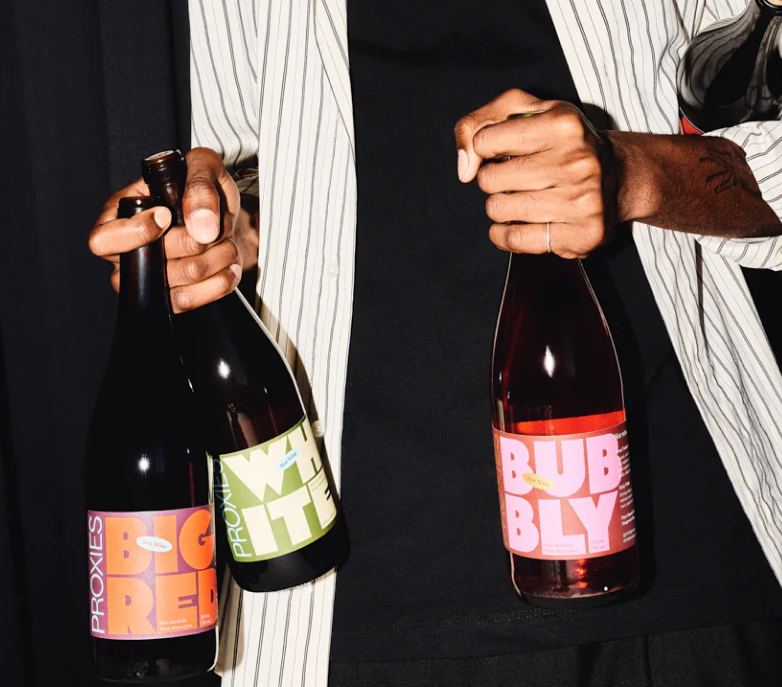
Proxies vs. Non-Alcoholic Wine
Share
Conventional non-alcoholic wines are made by stripping the alcohol out of cheap bulk wine. The result is a drink that tastes next-to-nothing like the real thing. They’re sweet, lack complexity, and don’t pair well with food.
Proxies, by contrast, are designed from the start with flavor and the ability to pair with food in mind. They’re designed to be an effective proxy, not a pale imitation. Instead of dealcoholized plonk, we craft layered blends of juices, teas, spices, bitters, and more. Proxies are wine, but not.
Read on for a closer look at what makes Proxies different than the non-alcoholic wine you’re used to.
A Library of Housemade Ingredients
Proxies draw on a library of hundreds of housemade ingredients. In addition to juices and teas, we call on a wide range of housemade bitters and tinctures, vinegars, and infusions. We don’t just add lemon juice when we want lemon flavor, but a combination of juice, oleo-saccharum, bitters, dried fruit, and more for dimensional layers of lemon. We add wood, teas, and hops for tannin and texture. We add floral ingredients for aromatics, and umami-rich vegetables for depth and earthiness. This approach to layered, complex flavor contrasts completely with conventional non-alcoholic wines where flavor is only subtracted, never added.
Winemaking And The Art of Blending
Our Proxies are made by an experienced winemaker explicitly dedicated to this project. Proxies are not an afterthought for our winemaker like non-alcoholic wines often are. In our lab, the pursuit of complex flavor consumes us. Blends are constantly tinkered with, tested, and never bottled until they’re ready. The art of skillful blending is behind many of the world’s greatest wines—from Champagne to Bordeaux, and beyond. We’ve studied and practiced wine blending, and we’re taking all that experience to blend these new ingredients into a new form of beverage. We call it The New Cru—all the complexity of great wine, none of the alcohol.
Who And What Are Wine Proxies For?
Conventional non-alcoholic wines don’t taste good enough to appeal to anyone who isn’t desperate for a substitute. They’re alcohol-free, but not much else. Sure, they might work in a pinch for pregnant women celebrating a special occasion but nobody is fooled and nobody really enjoys drinking them. We don’t think that makes sense. We think non-drinkers and people just trying to cut down on drinking deserve better. They deserve to have a sommelier pair their food with a drink that’s actually designed for the purpose. They deserve the feeling of downing a briny east coast oyster and following it up with a sip of lemony, minerally Muscadet, or trying a big and brawny California Cab that’s harsh on its own, then biting into a slice of dry-aged ribeye—the tannins smoothing out, the fruit coming to the fore to complement the rich meat with a tang of minerality.
That’s why we designed our Proxies to pair with and improve food just like the best wine. We designed them to live on restaurant wine lists, to be served in your best stemware, and even to be a mindful option to drink between bottles of wine over the course of a long evening around the dinner table. Proxies aren’t just non-alcoholic, they’re what Julia Bainbridge would simply call Good Drinks.
A New Form Of Beverage, A New World Of Flavor
In recent years, we’ve seen an explosion of non-alcoholic spirits and craft beers coming to the market. Most restaurants now offer alcohol-free cocktails, craft sodas, or kombuchas for those who don’t drink. But cocktails and sodas aren’t meant to pair with a meal. Drinkers choose wine for a reason. Food and wine are inextricably linked. A cocktail made with Seedlip or Ghia is not wine. Dealcoholized wine is also not wine—just ask all the restaurants and somms who don’t bother serving it. Proxies fill that gap. Proxies feature layers of complex flavor unlike anything on the market, with a healthy dose of acidity, body, and depth to ensure they pair well with high-end tasting menus, takeout splurges, and backyard barbecues alike. Not wine. Proxies.






















